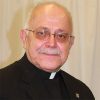In Lents past, I gave up something for 40 days, successfully making myself miserable so that, come Easter, I’d be happy to get back to my coffee, candy, soda, desserts or movies. Back in the day, as children we received a small cardboard box into which we’d place our spare change to be collected at Lent’s end and distributed to the poor.
Being on the pious side, I also tried to get to daily Mass before going to school; and making the Stations of the Cross every Friday made Lent feel complete. Thus, without even thinking about it, I practiced all Three Pillars of Lent: fasting, almsgiving and prayer.
As I look back, deeper insights and unexpected revelations emerge which help me to attain Lent’s goal: appreciation for — and to a lesser extent, participation in — the Passion and Death of our Lord.
For Catholics from 18 to 59 years of age, fasting on Ash Wednesday and Good Friday is still obligatory, eating only one meal with the other two not equaling another meal. Everyone over 14 is required to abstain from meat on Ash Wednesday and all Fridays of Lent. In addition to abstaining from meat, every Lent in recent years I give up one of my simple pleasures: drinking coffee. I never get headaches or go through withdrawal, but my mood takes a decidedly nasty tone. As one colleague put it, “Every time you give up coffee, we do penance.”
Ostensibly in tradition, fasting and abstaining from meat on Fridays was to honor the day Christ died for our sins. The money saved was supposed to go to the poor, for whom fasting and not eating meat was an involuntary and daily sacrifice.
Over the years we did the penance but forgot the poor.
During the Middle Ages it was not uncommon for upper-class people to pay poor people to perform the rich people’s penances. In a more contemporary example, something is lost spiritually if we substitute lobster for hamburgers.
After Vatican II the Church encouraged Catholics to do something positive during Lent, such as engaging in Bible study, visiting nursing homes or volunteering at soup kitchens. Almsgiving need not be monetary. Clothing, food or toiletries are appreciated.
Monastic traditions across religions help us to deepen our understanding of our Lenten practices. For example, all Buddhist men in Thailand are required to become monks for anywhere from six months to two years. They eat only one meal a day. Every morning at sunrise monks can be seen going door to door, silently begging for food. Even if a monk begs at the home of his own parents, no words are spoken.
The late Maryknoll Brother John Beeching, who worked and lived among the Buddhist monks of Thailand, explained, “Monks beg to give other people the opportunity to be generous and thus earn merit.”
One morning during Lent when I was in high school, I awoke to see it had snowed overnight. My father said I couldn’t go to Mass until I shoveled the sidewalk and driveway. I missed Mass that morning, which spoiled my perfect record. This, in turn, gave rise to resentment.
In confession the priest gently reminded me that honoring one’s father and mother takes precedence over personal piety. This gap in my Lenten practice was itself a grace, protecting me from spiritual pride.
Instead of priding ourselves on how “well” we observe Lent — distracting ourselves from the meaning and intent of our Lenten practices — we are invited, rather, to focus our gaze.
Keeping the suffering of Christ ever before our eyes in the person of the poor, the sick, the imprisoned and the dying ensures our Lenten sacrifices and service bring us closer to the Paschal Mystery.
Featured image: Children pray before eating lunch at the Bethlehem Centre preschool and day care in Addis Ababa, the capital city of Ethiopia. (Sean Sprague/Ethiopia)
![]()

